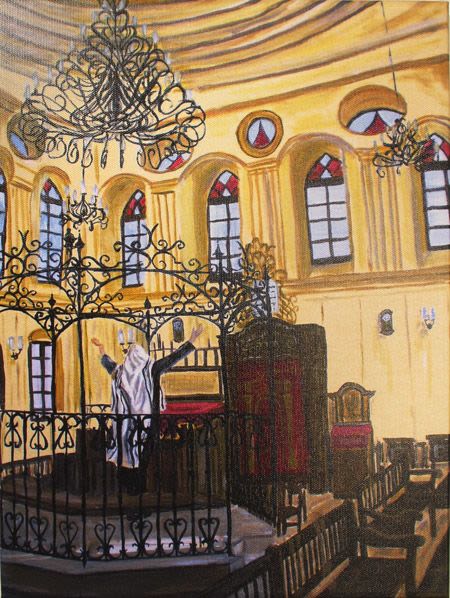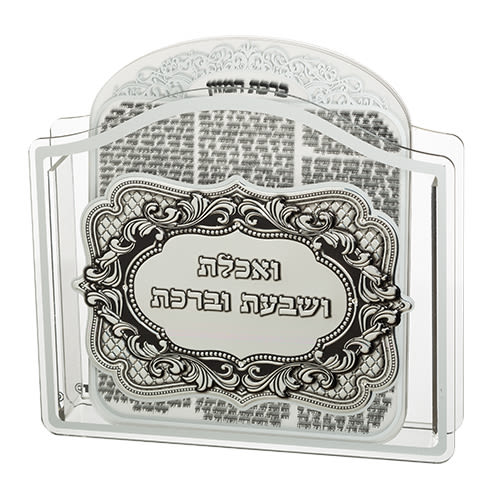
In the Desert of Despair
Trekking in the desert of despair dulls all the senses, causing confusion and more depression…

Trekking in the desert of despair dulls all the senses, causing confusion and more depression…no solution; no oasis of hope appears in the horizon…
We all reach a point in our life when we feel as if we’re walking in a spiritual desert of despair and that we are incapable of coping with the challenges facing us.
Trekking in the spiritual desert of despair, our senses become dull and we become confused – which in turn makes us even more depressed! It seems as if there is no solution or oasis of hope on the horizon. Because we are confused, we make mistakes. We might even decide to flee from reality and live in delusion. But it is precisely while in the desert that can discover our potential and then use that potential to move on and reach “civilization” – the hoped for salvation.
“So said Hashem: I remember to you the lovingkindness of your youth, the love of your nuptials, your following Me in the desert, in a land not sown” (Yirmiyahu/Jeremiah 2:2).
God said to the Jewish people: “I remember the days that you followed Me in the arid desert, in the overwhelming heat, with no water, as the sun beat down on your heads. But it is not only in a civilized place, where you readily see the goodness, where everything is blossoming and pleasant, shady and well watered, that you capable of becoming close to Me. Emunah, faith, is strengthened davka, precisely while struggling in the arid, parched desert.
“Remember! After walking in the desert you will certainly reach civilization. You will receive the help and salvation that you waited for in the unsowed land.
“You must know: I gave you wondrous abilities, tools that can assist you in coping with the challenges facing you. If you fall into despair, it is a sign that you are not aware of your potential. You need to discover them and use them. If you are able to joyously follow Me in the desert, it is a sign that you have discovered your potential and are using it to strengthen your emunah."
Let's look at some tools for discovering these inner abilities.
Emunah (Trust and Faith in God)
With emunah, we also believe in ourselves. Why? Because we know that the Almighty created us for a purpose and that we have the ability and unique talents necessary to fulfill that purpose
Our Sages say, “If you say that you toiled for it and then found it – you can be believed!”
It takes effort to discover our potential and learn to use it properly. But the Creator, who gave us these abilities, is with us in both the "desert" and "civilization." His Divine Providence is so exact that it includes Providence over the entire world, as well as over each and every one of us!
After discovering our unique talents and capabilities, we must be careful not to fall into the trap of thinking, “My strength and the might of my hands have made all this wealth.” We must remember that they were given to us by our Creator, to be used properly.
Rebbe Nachman says: “Know, lack of emunah is the main reason for the exile.” If lack of emunah is the main reason for our exile, then how do we leave the exile – the desert, to reach civilization – freedom? Through strengthening our emunah!
Speech
The power of speech is another tool for discovering our inner treasures.
How? Through using that power to converse with our Creator.
Rebbe Nachman says: “Hitbodedut (private conversation with God) is the highest and greatest level of them all.”
What is hitbodedut? Private and personal prayer.
Rebbe Nachman explains:
“A man should set a regular time, of at least an hour or more (one could certainly begin with ten minutes every day and then advance) to be secluded alone in a room or a field, to speak in a conversational way with his Creator. He should mention his claims and excuses, in a language of charm, conciliation and appeasement. He should beseech and supplicate God that He will allow him to come close to Him and to His Divine Service. This conversation should always be in his spoken language (which means to say, in your manner of speech, simply, as you would speak with your friends)…he should relate and converse about everything that weighs on his heart before his Father in Heaven…” (Likutey Moharan, 2:25).
Rebbe Nachman explains that the power of speech is the power that strengthens the relationship between the Almighty and us. Hitbodedut is a tool for finding our place both in the world and within ourselves.
When we pray in our own language, we express our inner thoughts – the difficulties and successes of day-to-day life. We can check our “spiritual accounting” on a continuous basis. Hitbodedut enables us to discover our God-given potential.
Rebbe Nachman said that not only did he succeed in elevating himself spiritually through hitbodedut, but that hitbodedut is the reason all righteous men attain their lofty spiritual level!
Try to set aside time each day for personal prayer; a time to share freely with the Creator. Speak with Him as you would speak to a close friend. Tell Him how much you want to discover the powers He gave you – and that you want to use them to become close to Him. Tell Him that you need encouragement in every area of life, in both the material and spiritual realms. Thank Him for all you have received from Him, for all the kindness and goodness that He has given you. Beseech Him for all that you need, in both the material and spiritual. Just speak to Him! Even if you can only say one word –say it! Every word is precious to Him and will help you in discovering your inner treasure.
Truth
Every man needs to seek truth – not just any ordinary truth, but the absolute truth. Truth is directly related to emunah.
We must, however, be careful not to let truth become a tool of the yetzer hara. In other words, if we employ truth to see where we've gone wrong, and ignore our positive points, it will cause us to become depressed and lose hope.
The Sages tell the story of a debate between God and the ministering angels about the wisdom of creating man:
“When God was about to create Adam HaRishon, the first man, the ministering angels were divided into two separate camps with two separate opinions – one group said: ‘Do not create him,’ and the second said ‘Create.’ The Trait of Lovingkindness said: ‘Create him, because he will perform acts of kindness.’ Righteousness said: ‘Create him, because he will perform deeds of charity.’ Peace said: ‘Do not create him, because he is full of arguments.’ Truth said: ‘Do not create him, because he is full of falsehood.’
“What did God do? He took the Truth and flung it to the earth, as the verse states: ‘And He flung truth to the earth.’ The ministering angels asked God: ‘Why are you disparaging your signet ring [God signed the Torah with Truth]?’ ‘Let Truth arise from the earth,’ [was the response] as the verse states: ‘Truth will sprout forth from the earth’” (Midrash Raba, Bereishit 8).
How did the Almighty react to Truth's accusation? He flung Truth down to the earth. We are commanded “Resemble Him in His ways.” We must distance ourselves from “truthful” prosecution – the truth of the yetzer hara.
We must discard the "truth" that stops us from seeing the good within ourselves and prevents us from developing the positive aspects of our personality and changing the negative aspects of our personality. Even when yetzer hara's prosecution seems to represent the truth, we must emulate God and fling it far away from us.
Moshe responded this way when he broke the two stone tablets of the Covenant – the Ten Commandments. When Moshe saw that the Children of Israel had sinned with the Golden Calf, he threw away the truth because it was accusing the Jews.
We should follow Moshe's example. Instead of focusing on the accusation, we must fling it far away from us and turn to God in personal prayer, especially when the yetzer hara tries to stop us from seeing the spark of light within ourselves. Only then will “Truth will sprout forth from the earth.” God threw truth to the earth; we are charged with cultivating it, so that absolute Truth will sprout forth, a Truth that does not accuse or prosecute.
Azamra (I will sing)
“Azamra” means searching for and finding the good in others and in ourselves. It is a Torah that teaches us to extract the good from the bad, light from darkness and kindness from strict judgment (Likutey Moharan, 282).
When we are depressed, we are incapable of perceiving the good in ourselves and in others.
Rebbe Nachman teaches that a spark of goodness exists in every situation, and that it is our task to find it and grow from it. We shouldn't focus on the fact that the glass is half empty; instead, we should focus on the fact that the glass is half full.
Let's try to judge ourselves favorably. Once we discover one point of pure light within ourselves, we will discover many more and until we reach such a level of spiritual strength that we will be able to eradicate hypocrisy and evil from ourselves.
Reb Natan would say, “I will sing, I will only sing!” We must judge others favorably and focus on the positive. Even when we fail, we can discover something positive hidden within our failure. Every downfall can be used to encourage a comeback. From the darkness of night, dawn is revealed.
Remember!
No matter how difficult the situation, we are never alone! The Almighty granted us awesome powers – gifts – to deal with the challenges facing us.
It is up to us to use the powers of emunah, hitbodedut, truth and looking for the good to overcome the challenges of a spiritual desert.












Tell us what you think!
Thank you for your comment!
It will be published after approval by the Editor.